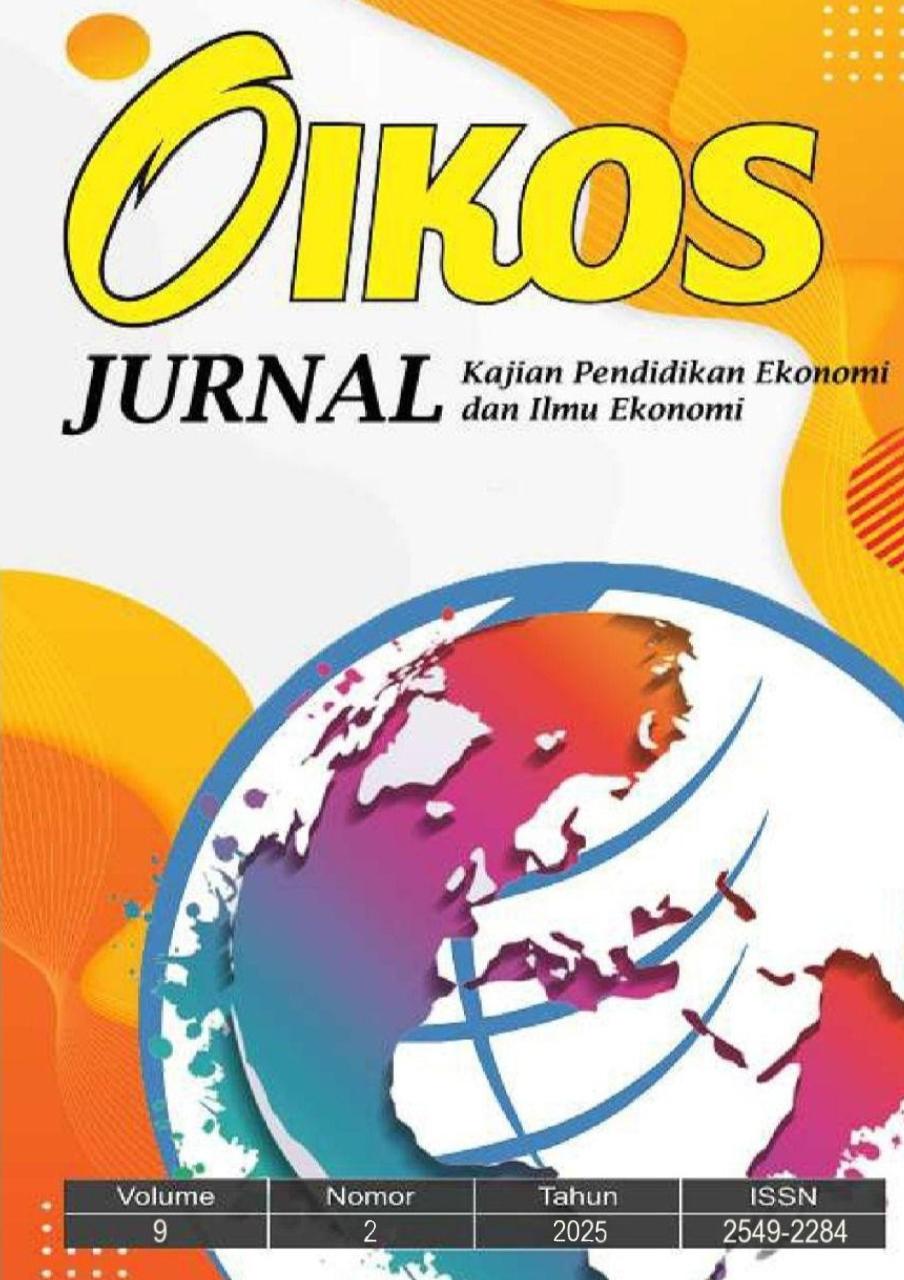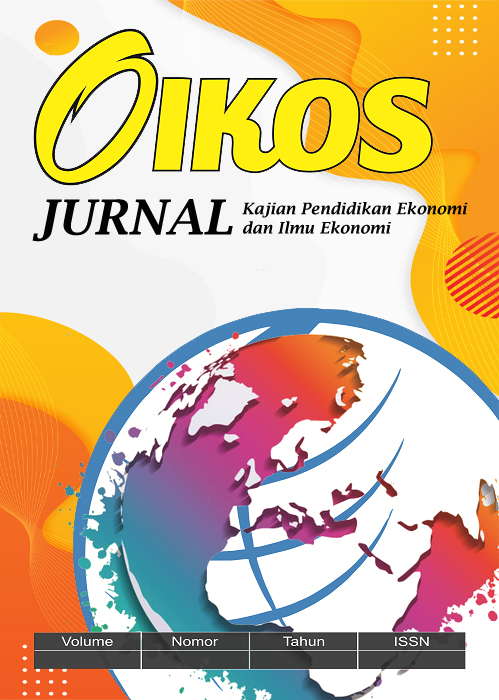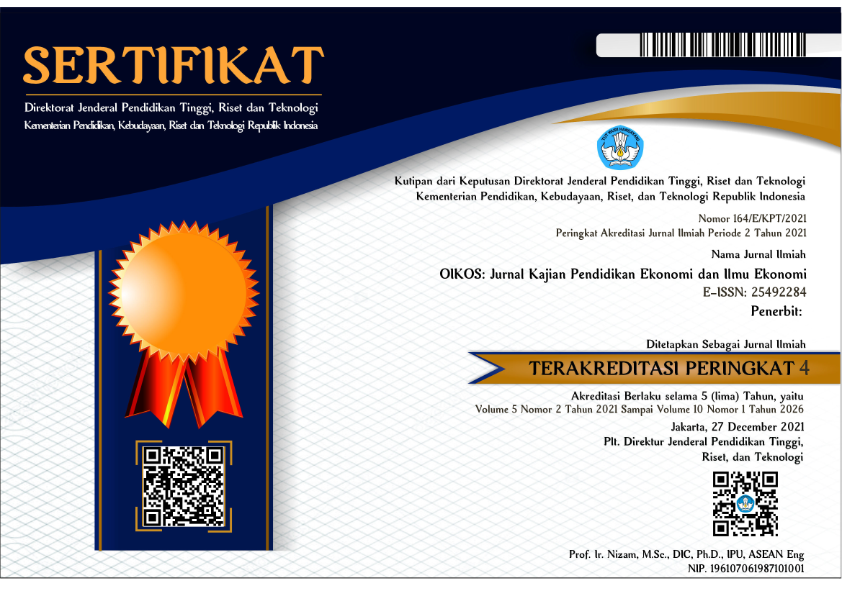ERA DIGITAL: PENGARUH INOVASI TEKNOLOGI TERHADAP PERTUMBUHAN EKONOMI DI INDONESIA
Keywords:
Digitalisasi, E-Commerce, Ekonomi Digital, FintechAbstract
Seiring dengan berkembangnya globalisasi, aktivitas masyarakat menjadi lebih mudah dilakukan. Kemajuan teknologi di sektor ekonomi memungkinkan para pelaku usaha untuk memasarkan produknya secara lebih efisien ke pasar yang lebih luas, terutama di pasar global. Penelitian ini bertujuan untuk menganalisis pengaruh ekonomi digital terhadap pertumbuhan ekonomi Indonesia yang diukur melalui nilai Produk Domestik Bruto (PDB). Variabel yang digunakan dalam penelitian ini meliputi jumlah pengguna internet, pengguna e-commerce, nilai transaksi e-commerce, dan banyaknya perusahaan fintech. Metode analisis yang digunakan adalah Ordinary Least Square (OLS) pada data time series tahun 2007 hingga 2021. Data tersebut bersumber dari BPS, Asosiasi Penyelenggara Jasa Internet Indonesia (APJII), KataData, dan Otoritas Jasa Keuangan (OJK). Hasil penelitian menemukan bahwa banyaknya perusahaan fintech di Indonesia memberikan kontribusi positif terhadap pertumbuhan ekonomi berkat inovasi dan kemudahan yang diberikannya. Di sisi lain, nilai transaksi e-commerce dan banyaknya pengguna internet memberikan dampak negatif terhadap pertumbuhan ekonomi. Selain itu, jumlah pengguna e-commerce tidak menunjukkan pengaruh signifikan terhadap pertumbuhan ekonomi.
Downloads
References
Aisyah, S., & Pratika, T. (2024). Digital Financial Transformation in The Financial Inclusion Program and Its Impact on Income Inequality: The Case of Middle-Income Countries. Proceedings of the 4th Borobudur International Symposium on Humanities and Social Science 2022. https://doi.org/10.2991/978-2-38476-118-0_32
Anisa, A. N., & Setyowati, E. (2023). Analisis Peran Ekonomi Digital Terhadap Ketahanan Dan Pertumbuhan Ekonomi Di Indonesia. SEIKO : Journal of Management & Business, Vol 6(1). https://doi.org/10.37531/sejaman.v6i1.3745
Anvari, R. D., & Norouzi, D. (2016). The Impact of E-commerce and R&D on Economic Development in Some Selected Countries. Procedia - Social and Behavioral Sciences, 229, 354–362. https://doi.org/10.1016/j.sbspro.2016.07.146
APJII. (2024, February 7). Jumlah Pengguna Internet Indonesia Tembus 221 Juta Orang. Asosiasi Penyelenggara Jasa Internet Indonesia. https://apjii.or.id/berita/d/apjii-jumlah-pengguna-internet-indonesia-tembus-221-juta-orang.
Benabed, A., & Boeru, A.-C. (2023). Globalization beyond Business Sustainability, Energy and the Economy of the Future. Proceedings of the International Conference on Business Excellence, 17(1), 1569–1583. https://doi.org/10.2478/picbe-2023-0141
Bryniuk, K. (2023). Is the Gross Domestic Product (GDP) a Reliable Indicator of the Economic Growth and Future Economy of the United States of America? OALib, Vol. 10(4). https://doi.org/10.4236/oalib.1110100
Dharma, B., Mudrikah, A., & Hubara, Z. A. (2022). Pengaruh Nilai Transaksi E=Commerce Terhadap Pertumbuhan Ekonomi di Indonesia 2017-2021. Jurnal Publikasi Informasi Dan Manajemen Bisnis (JUPSIM) , Vol.1(3).
George, G., & Schillebeeckx, S. J. D. (2022). Digital transformation, sustainability, and purpose in the multinational enterprise. In Journal of World Business: Vol. Vol. 57 (Issue 3). Elsevier Inc. https://doi.org/10.1016/j.jwb.2022.101326
Guzel, A. E., Arslan, U., & Acaravci, A. (2021). The Impact of Economic, Social, and Political Globalization and Democracy on Life Expectancy in Low-Income Countries: are Sustainable Development Goals Contradictory. Environment, Development and Sustainability, Vol. 23(9). https://doi.org/10.1007/s10668-021-01225-2
Hindrayani, A., & Puspitasari, I. F. (2019). How Does Electronic Payment System Affect the Development of E-Commerce Business. Economica Journal, Vol.8(1). https://doi.org/10.22202/economica.2019.v8.i1.3604
Kementrian Koordinator Bidang Perekonomian Republik Indonesia. (2023). Buku Putih Strategi Nasional: Pengembangan Ekonomi Digital Indonesia 2030. https://fe.unj.ac.id/wp-content/uploads/2023/12/Buku-Putih-Strategi-Nasional-Ekonomi-Digital-Indonesia.pdf
Nguyen, C. P., Schinckus, C., Nguyen, Q. B., & Tran, D. T. Le. (2024). Digitalization and Informal Economy: a Global Evidence of Internet Usage. Journal of Industrial and Business, Vol. 51. https://doi.org/10.1007/s40812-023-00278-w
Prasetyo, F. A., & Mustaqim, M. (2024). Financial Technology, Financial Knowledge, and Financial Attitude of Generation Z: Determinants of Financial Behavior. Journal of Enterprise and Development (JED), Vol. 6(2). https://doi.org/10.20414/jed.v6i2.9836
Putri, E., Praswati, N. P., Muna, N., & Sari, N. P. (2022). E-Finance Transformation: A Study of M-Wallet Adoption in Indonesia. JEP: Kajian Masalah Ekonomi Dan Pembangunan, 23(1). https://doi.org/10.23917/jep.v23i1.15496
Putri, K., Azmi Puteh, C., Sirait, E. V., Lie, J., Rabintar, D., & Simanjorang, F. (2023). Analisis Efek Globalisasi Terhadap Perdagangan Internasional Negara Indonesia. Jurnal Kendali Akuntansi, Vol.1(3). https://doi.org/10.59581/jka-widyakarya.v1i3.508
Reddick, C. G., Enriquez, R., Harris, R. J., & Sharma, B. (2020). Determinants of Broadband Access and Affordability: An Analysis of a Community Survey on the Digital Divide. Cities, Vol. 106. https://doi.org/10.1016/j.cities.2020.102904
Shin, Y. J., & Choi, Y. (2019). Feasibility of the Fintech Industry as an Innovation Platform for Sustainable Economic Growth in Korea. Sustainability (Switzerland), Vol. 11(19). https://doi.org/10.3390/su11195351
Shino, Y., Lukita, C., Rii, K. B., & Nabila, E. A. (2022). The Emergence of Fintech in Higher Education Curriculum. Startupreneur Business Digital (SABDA), Vol.1(1). https://doi.org/10.33050/sabda
Shlapak, A., Yatsenko, O., Ivashchenko, O., Zarytska, N., & Osadchuk, V. (2023). Digital Transformation of International Trade in The Context of Global Competition: Technological Innovations and Investment Priorities. Financial and Credit Activity: Problems of Theory and Practice, Vol. 6(53). https://doi.org/10.55643/fcaptp.6.53.2023.4241
Simatupang, N., Siregar, N., Fazirah Harahap, N., & Suhairi, S. (2023). Manajemen Ekspor Dan Impor Global. Jurnal Minfo Polgan, Vol. 12(2). https://doi.org/10.33395/jmp.v12i2.13299
Solihat, M., & Sandika, D. (2022). E-commerce di Industri 4.0. Vol.16. https://doi.org/10.32812/jibeka.v16i2.967
Statista. (2023). Statista about E-Commerce Asia. Statista. https://www.statista.com/statistics/1040590/apac-e-commerce-share-of-total-retail-by-country/
Statistik, B. P. (2023). Statistik E-Commerce 2022/2023. https://www.bps.go.id/id/publication/2023/09/18/f3b02f2b6706e104ea9d5b74/statistik-ecommerce-2022-2023.html
Tanjung, A. A., Syafii, M., Tarigan, S. B., & Harahap, W. G. (2022). Analisis Pengaruh Ekonomi Digital Terhadap Pertumbuhan Ekonomi di Indonesia: Model Data Panel. Ekonomi, Keuangan, Investasi Dan Syariah (EKUITAS), Vol.4(2). https://doi.org/10.47065/ekuitas.v4i2.2223
Toska, A., & Fetai, B. (2023). The Impact of E-Commerce on the Economic Growth of theWestern Balkan Countries: A Panel Data Analysis. International Journal of Sustainable Development and Planning, Vol.18(3). https://doi.org/10.18280/ijsdp.180329
Turban, E., King, D., Lee, J. K., Liang, T.-P., & Turban, D. C. (2015). Electronic Commerce : A Managerial and Social Network Prespective. Springer International Publishing. https://doi.org/10.1007/978-3-319-10091-3
Xiao, A., Xu, Z., Skare, M., Qin, Y., & Wang, X. (2024). Bridging the Digital Divide: the Impact of Technological Innovation on Income Inequality and Human Interactions. Humanities and Social Sciences Communications, 11(1). https://doi.org/10.1057/s41599-024-03307-8
Downloads
Published
Issue
Section
License
Copyright (c) 2025 OIKOS: Jurnal Kajian Pendidikan Ekonomi dan Ilmu Ekonomi

This work is licensed under a Creative Commons Attribution 4.0 International License.









